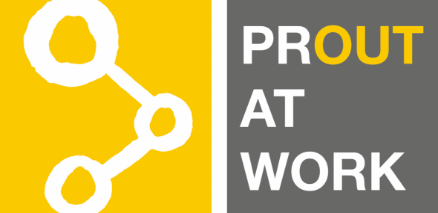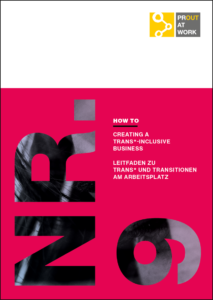
MYSTORY with …
Hanna
57 Years, Kreis Euskirchen
“For a very long time I was searching for
myself and at times I confused this with
the search for other, material things…”
Published: March 2023
Night of REalization.
It took 47 years for my life to make any sense at all. That’s how long it took before I was able to admit to myself that something very essential had always been wrong. But it was only then that I fully understood what that was.
Since then, I understand my life, looked backwards at and lived forwards, at all!
As a child, the awareness that I was different was already there, but it was more of a background noise. As time went on, however, these experiences, encounters, and thoughts that always felt so out of place and that I couldn’t really place began to accumulate. These things ran through my life like a red thread and only in retrospect did I really understand them.
For example, the first time I had painted toenails – long before my inner outing – I didn’t think, “Oh, how nice,” but “now it finally looks right!” I wondered about this thought in the same second and didn’t really understand where it came from.
There were many such experiences, all somehow small and insignificant, but in sum absolutely self-explanatory.
When I was about 15 years old, I was, as I see it today, very close to understanding what was going on with me. For example, I was waiting for my figure to develop in the same way as my girlfriends and wondered why it didn’t. When I look back now, it was quite clear. But at that time I couldn’t and didn’t want to dig any further…
Many years later, it came to – what I call – my “night of realization.” The night when all the puzzle pieces of my life finally fell into place. The night I then had to understand that I am a woman and always have been. That night when everything suddenly and fully made sense. On the one hand, it was simply great to finally have the explanation for everything that had moved me for decades: “Hanna, you are a woman and always have been. From the first day you were born, you have always thought, acted, and felt like a woman.” On the other hand, the realization of actually being a woman was extremely difficult to master and I oscillated back and forth between euphoria and suicidal thoughts! The topic “trans*” was in the room, but I just did not want to accept that I am also trans*.
And of course, I still had doubts, so I often said to myself, “You are crazy! You are sick! That’s why I found it very special that after my coming out there were some people who told me:
“Hanna, it’s about time that you understand it yourself”!
That helped me to manage these permanent doubts.
The reactions in the rest of my environment were mixed. My parents didn’t find out that their supposed son was actually a daughter, because they had already passed away before I came out. I couldn’t even begin to estimate how they would have handled it. Part of my family had the most difficulty dealing with it, and they tried to completely hide the issue. It wasn’t until years after I came out that they really started to confront the situation. Today everything is fine, but the journey was long and painful.
Simultaneously, I also had to sort out some important things for myself. My internal outing was one thing, but how should I implement it – especially at work? At the beginning, I still believed that I could keep it completely out of my everyday professional life, continue to pretend that I was a man, and only live out my true self in my free time. How naive I was back then… I then looked for a new job relatively quickly. Of course, I also applied for a job as the woman I am. It took a little while, but today I’ve been with my current employer for almost 8 years, and I took over my current position about 2 years ago.
Looking back, I realized for myself that only since I’ve been truly me, I’ve had something like a career. I always knew I was a good employee, but I could never really stand up for myself. I’ve been working openly as a woman for 8 years now, and I find it amazing how far I’ve come professionally. From night auditor to reception manager and service manager within a few weeks, then site manager with a team of 21 employees and now in my dream role.
I summarize it for myself like this: I first had to understand that I am a woman in order to be able to appear as self-confident as men usually do.
My coming out and my transition have of course not only brought changes at work, but also in the relationship with my wife. We have been together for over 27 years now and we have found that despite the changes and the turbulent time during my transition, our relationship has gained in quality and depth! Most of the people who know us from the past simply accept us for who we are and should there ever be any questions, our message is: Love knows no gender!
Today I can say: I have arrived!
For a very long time I was searching for myself and at times I confused this with the search for other, material things – and I had to realize that these things did not really make me happy. I have found true happiness in myself and only since I have found myself, I know what happiness really means!
DEAr Hanna, Thank you very much for YourStory!
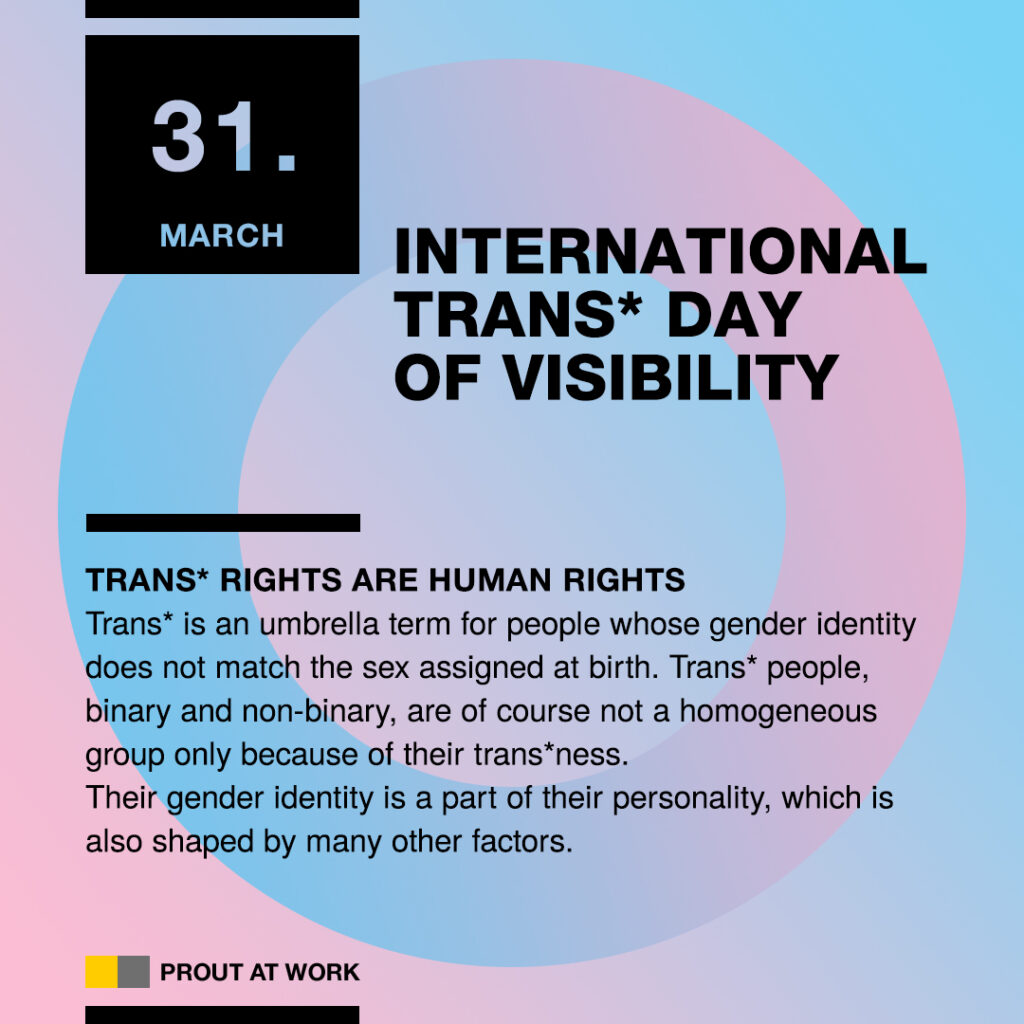
Trans* Day of Visibility (TDoV) has taken place each year on March 31 since 2009. The day is dedicated to raising awareness and visibility for trans* people and drawing attention to existing discrimination and transphobia. The day also provides a special opportunity for cis people to show solidarity with trans* people and stand up for equal rights. For us it is clear: #TransRightsAreHumanRights.
Trans* is used adjectivally and serves as an umbrella term for people whose gender assigned at birth does not match their gender identity. The asterisk (also asterisk) represents the multiplicity of possibilities of gender identities and gender expressions. Trans* thus refers to a diverse spectrum of identities, lifestyles and concepts that do not (want to) be located exclusively in a binary way.
All people should have the right to determine their own definition of their gender identity. The so-called “Transsexuellengesetz” (TSG) has prevented this for decades and is an example of the ongoing discrimination against trans* people. A new self-determination law must replace the TSG in order to protect trans* people from lengthy and humiliating procedures and make it easier to uphold their basic and human rights.
More information about trans* and trans* people can be found on Queerlexikon.
On the occasion of this year’s TDoV, we want to present you with the books “Being Human” by Alice Oehninger and “Ich bin Linus: Wie ich der Mann wurde, der ich schon immer war” by Linus Giese, the movie “Trans – I Got Life” and the MyStory’s by Hanna Brungs and Marit Wiechmann, personal stories of trans* people, but also tips and information about trans* at the workplace via our How To Guide No. 9 “Trans* and Transitions at the Workplace”.
ICH BIN LINUS: WIE ICH DER MANN WURDE, DER ICH SCHON IMMER WAR By LINUS GIESE

Linus has suspected that he is trans* since he was six years old. But out of shame and ignorance about terms such as queer, trans* and non-binary, he hid his true self for a long time. In 2017, he frees himself from his old life with the sentence “I am Linus”. In his book, Linus Giese also talks openly about the highs and lows of his journey, on which he repeatedly encounters hatred, especially on the internet. But that doesn’t stop him from standing up for the rights of trans* people.
Bein Human – An Autobiography by Alice Oehninger
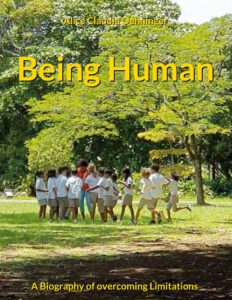
Alice is trans*. She looks like a white boy. In traditional Tanzania, she is expected to play this role. She goes through love and rejection and discovers a strong desire to be a parent. Playing the role of a man, she marries and finds happiness in Germany until a crisis destroys her fragile world.
Meetings and border crossings in cultures and gender. A very personal story that touches and invites reflection.
Trans – I Got Life
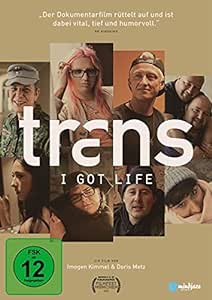
TRANS – I Got Life distils the broad spectrum of trans identity from the life stories of seven charismatic people. TRANS – I Got Life is a sensual journey into the in-between worlds beyond fixed gender norms, into intimate living spaces and into surgery, which becomes a delivery room for a second birth. In a subtle and multi-layered way, the trans experience is also transferred to the visual and audio level.
Creating a trans*-Inclusive Business – How To Guide Nr. 9
The guide covers the topic of trans* in the workplace and addresses employers, colleagues and trans* people themselves. It contains tips, information and experience reports to raise awareness and educate people on the topic. In addition, an exemplary process of a transition at the workplace is outlined and assistance for communication is offered.
Night of Realization – MyStory with Hanna
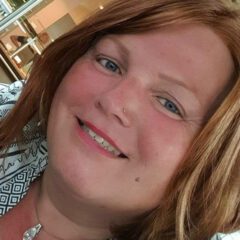
For a very long time I was searching for myself and at times I confused this with the search for other, material things – and I had to realize that these things did not really make me happy.
TRANS* IS SOMETHING WONDERFUL – MyStory with MArit Wiechmann
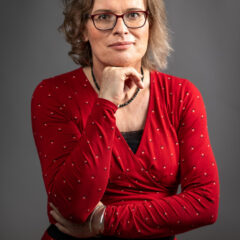
As a woman, I now have the courage to do things, make decisions and accept help. Why? What could happen if something goes wrong? After all, I am a human being with strengths and weaknesses and I am allowed to make mistakes, but also to be successful.
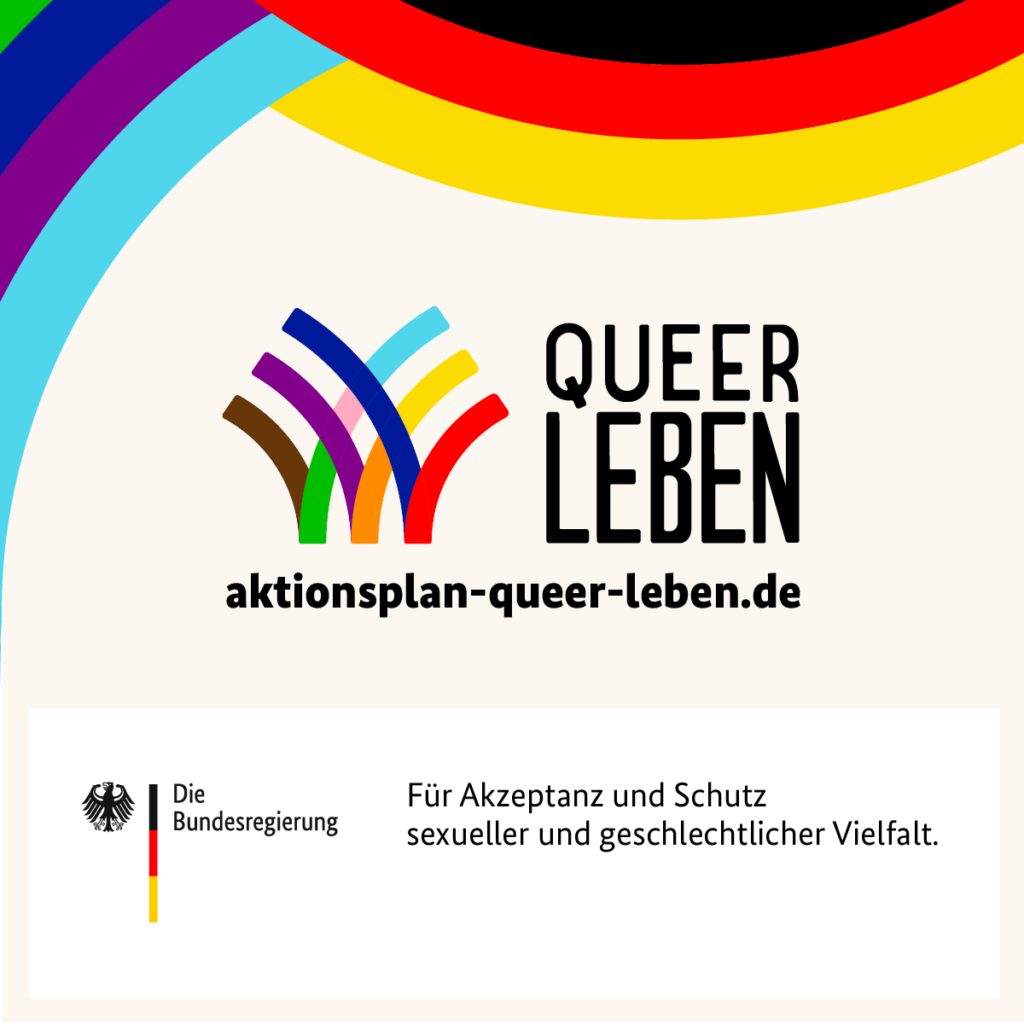
On November 18, the federal cabinet decided on the action plan “Queer Leben”, as scheduled in the coalition contract. Different plans for acceptance and protection of sexual and gender diversity were hilighted, and six topic points were solidified:
- Recognition by law
- Participations
- Security
- Health
- Strenghtening of the Communities
- International issues
Update March 22, 2023
On March 20, the Queer Representative of the Federal Government Sven Lehmann welcomed to the launch event of the Aktionsplan “Queer Leben” in Berlin. PROUT AT WORK, together with numerous organizations, belongs to the circle of those who bring the action plan to life.
The aim of the event was to launch the official implementation of the action plan. The more than 200 participants from various associations and organizations exchanged ideas and formed working groups, which in turn will discuss the concrete implementation of the action plan’s projects in the coming months.
Prior to the event, 78 civil society organizations were selected from more than 140 applications in order to bring as many different perspectives as possible to the working groups. We are very pleased that PROUT AT WORK is also one of the selected organizations and will be represented by our board member Albert Kehrer.
The launch event as well as the formation of working groups represent the first necessary steps towards the implementation of the action plan for a queer-friendly society and we are looking forward to placing important topics around LGBT*IQ in the workplace there in the future.
THE AKTIONsPLAN IN THE WORK CONTEXT
In addition to topics such as the Self-Determination Act, the reform of the Parentage Act, and blood donation, other issues important to the work context were also addressed under the heading of “participation”. These include the following measures:
- Expansion of the diversity topic pillar as part of the “New Quality of Work (INQA)” initiative of the Federal Ministry of Labor and Social Affairs (BMAS);
- Research projects on the situation/discrimination of LGBT*IQ in the world of work as well as improving the promotion of projects for acceptance;
- Development of a guideline for employers that includes the recommendations for action of two studies on the “Third Option” in a comprehensible way for use in everyday work;
- Sensitization of employers, trainers, employee representatives for the concerns of LGBT*IQ employees and applicants;
- Support for raising awareness of LGBT*IQ issues in in-company training;
- Establishment of a dialogue process (federal government, states, collective bargaining parties, church employers) on improving the working conditions of LGBTIQ* in institutions of churches and religious communities;
- Promotion of diversity management in the federal public service;
Additional measures in the area of federal administration:
- Development of an internal federal diversity strategy (incl. creation of further training opportunities, support for the establishment and networking of employee networks and a strategy for diversity-sensitive personnel selection procedures);
- Implementation of diversity issues (incl. LGBT*IQ/gender identity) in initial, further and advanced training (e.g. qualification measures by the Federal Ministry of Defense [BMVg] in civilian and military training and by the Federal Foreign Office in training in the Foreign Service); Regularly strengthening the educational and advisory competence of the social service in the Bundeswehr on the diversity issue; Conducting systematic baseline analyses on the situation of LGBT*IQ (e.g., with the help of employee surveys);
- Sensitization of employees to implicit prejudices and integration in competence requirements/competence models;
- Sensitization and, if necessary, training of employees involved in recruitment processes;
For more information about the plan “Queer Leben”, feel free to drop by the Federal Ministry for Family Affairs, Senior Citizens, Women and Youth.
PROUT AT WORK Welcomes the Action plan “Queer Leben”
“In addition to topics such as the overdue Self-Determination Act, the reform of the Parentage Act, and a reform of blood donation, the action plan also addressed other aspects that are important for the work context, which we very much welcome and which provide important impetus for our work.” Albert Kehrer, CEO of PROUT AT WORK.

For more information around trans* in the workplace, the third option, and other workplace related LGBT*IQ topics, we encourage you to check out our free HOW TO guides.
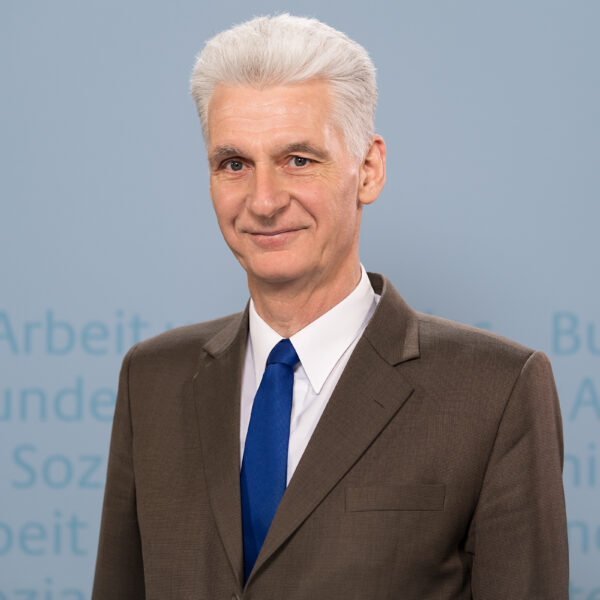
MYSTORY with …
Rolf
64 Years, Berlin
“It has always been important to me
to live with children, to be linked to
the future through children…”
Published: March 2023
Long Ways.
The first time I had sex with a man, it was still forbidden – it happened in what was then West Germany. Shortly after that, rumours about a newly discovered virus began to spread. Deadly. Soon it was clear that homosexual men were particularly affected. The German magazine Der Spiegel wrote about the “Schwulen-Pest,” a translation of the term Gay Plague. We had to be cautious.
Today I live in a different world. I am married to a man. And we have children, too.
This would not have been possible without fundamental changes in our laws during the last 30 years. What seems to be nothing special today was wishful dreaming or even unthinkable back then.
It has liberated me. I came out when I moved to Berlin, quite late, at the age of 35. My life would have been different if I had been clear about who I was and how I loved earlier. I had been living with a vague idea of bisexuality far too long. Today I think this was also because at that time I could not imagine how to combine my desire to have children and my love for men.
I am very grateful to all those in my life who have encouraged me on this path and made it possible. And I am happy for everyone who clearly knows early on and I understand everyone who needs time for this. The open interaction in queer networks can help and encourage people on this way. And these networks now exist in many federal agencies, including the ministries of the Federal Government.
LGBTIQ* employees still experience discrimination in the workplace far too often. Even small talk at the coffee machine can quickly lead to an unwanted outing. Often enough, not only their well-being at work, but also their professional future depends on the reactions of their superiors and colleagues. But only those who feel at ease can deliver the best results at work. Organisations, companies and administrations can actively contribute to an inclusive corporate culture. On INQA.de you can read how networks or interest groups in companies can help to improve the situation of LGBTIQ* employees at work.
Ending discrimination requires the support of those who are not affected. Through active solidarity (allyship), companies can promote diversity in the world of work. On INQA.de you find five tips on how managers and employees can work for diversity and show: We are Allies!
DEAR ROLF, Thank you very much for YourStory!
RECAP
We were excited to welcome Wolfgang Link as a guest at our PROUT PERFORMER Lunch Talk on Wednesday, February 22, 2023.
Click here for the recording of the interview (German):
About Wolfgang:
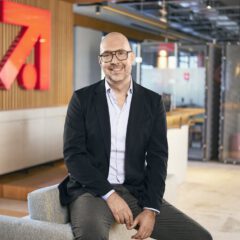
Wolfgang Link was appointed to the Executive Board of ProSiebenSat.1 Media SE in March 2020. He is responsible for all entertainment activities of ProSiebenSat.1 Media SE and is CEO of Seven.One Entertainment Group.
He joined the ProSiebenSat.1 Group in 2009 as Head of Entertainment at SAT.1, and was later responsible for all entertainment formats of the German station group as Senior Vice President, bringing “The Voice of Germany” to Germany, for example. From 2012 to 2016, he was Managing Director of ProSieben, became Managing Director of ProSiebenSat.1 TV Deutschland GmbH in October 2013 and took over as Chairman of the Executive Board shortly afterwards. In 2019, as co-CEO, he was responsible for merging the station brands, content, marketing and distribution operations under the umbrella of the Seven.One Entertainment Group, which will operate in 2020.
After studying communications, arts and psychology, Wolfgang Link initially worked for various musical and live productions. From 2003, as a producer and executive producer at Grundy Light Entertainment, he helped make the “Deutschland sucht den Superstar” format a success, among other things.
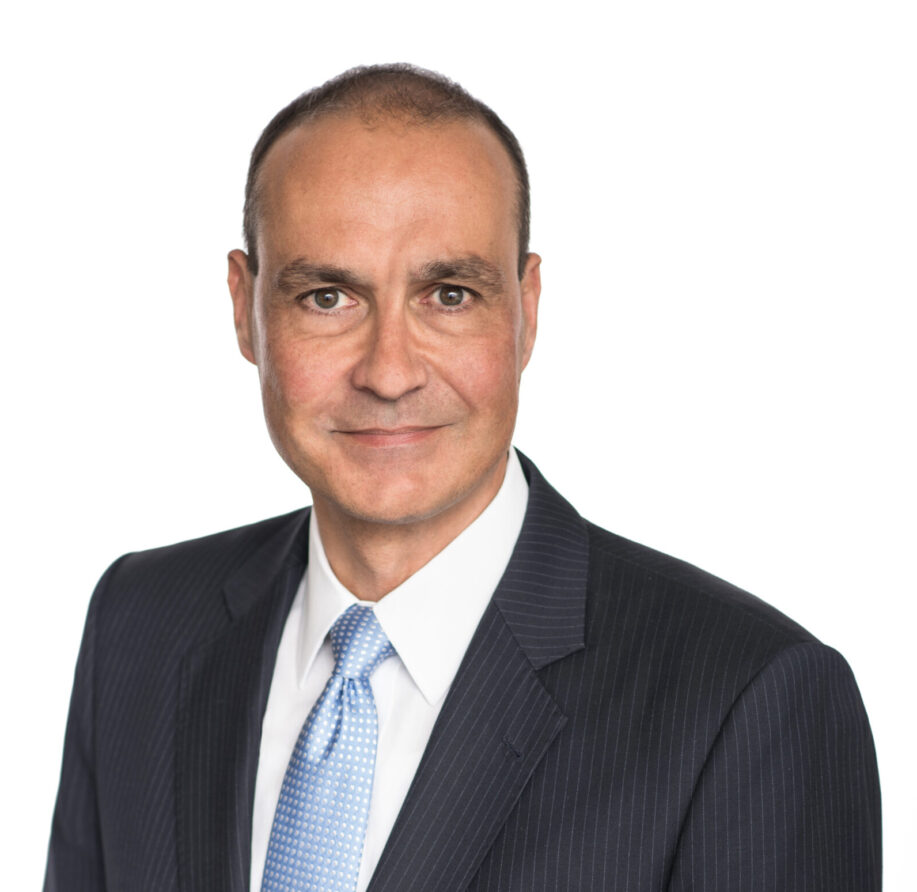
PROUT EMPLOYER Hogan Lovells
“The diversity of our employees is important to me – not only because of my role as Managing Partner and Diversity Sponsor, but also personally. As a company, we function best when people feel comfortable with us and have trust in our working relationship.”
Dr. Stefan Schuppert advises companies in the field of data protection and information technology. He is Managing Partner for the German offices of the international law firm Hogan Lovells and also Sponsoring Partner for Diversity in EMEA. In 2021 and 2022, he was recognized as a PROUT Executive Ally.
Hogan Lovells has been a PROUT EMPLOYER since 2017 – so it has been committed to LGBT*IQ diversity for a long time. Why is this particularly important to you?
Dr. Stefan Schuppert: As a global law firm, we have been committed to equal opportunity, appreciation and respect for many years. The diversity of our employees is important to me – not only because of my role as Managing Partner and Diversity Sponsor, but also personally. As a company, we function best when people feel comfortable with us and have trust in our working relationship. In an open working atmosphere, we can be creative and find innovative solutions for our clients. And the work is fun! It’s a positive sign for all our employees when we commit to equal treatment for all people and an appreciative, respectful working atmosphere.
In 2022, Hogan Lovells’ LGBT*IQ network, Pride+, celebrates its 5th birthday. Congratulations! What do you see as the biggest success of the network so far?
Dr. Stefan Schuppert: Thank you! We are very proud that this network has been part of our everyday life for five years. Pride+ is present and active at all our locations and provides assistance even in countries where it is not so easy to promote LGBT*IQ issues. Pride+ promotes knowledge about the LGBT*IQ community, sensitizes people to diversity issues and supports the visibility of role models. And it connects us to one another – because as “allies” we demonstrate our solidarity with our LGBT*IQ colleagues.
What advice would you give to companies that are still at the very beginning of their commitment to LGBT*IQ diversity?
Dr. Stefan Schuppert: My advice would be: just do it and keep at it, even if the seats at the first diversity events are not booked out right away. It’s important to raise awareness of the issues. Because it’s often ignorance that leads to discrimination. This is where PROUT AT WORK, as an important partner, can help to overcome uncertainties and build up knowledge.
For the acceptance of the topic, it’s also important that the “tone from the top” is visible every day. My advice is to win over important role models in the senior management team for the topic.
Ultimately, it is crucial that all employees – regardless of hierarchy – are committed to the topic of diversity and help create an open and appreciative culture.
Where do you see the challenges to LGBT*IQ diversity at Hogan Lovells in the coming years?
Dr. Stefan Schuppert: Especially after the pandemic and in times of many very present crisis situations, it is important to sensitize employees again to LGBT*IQ and other diversity topics. Here we would like to create as many opportunities and incentives as possible. We offer exciting lunch talks with external and internal speakers, workshops, team events and much more. Because it is often ignorance that leads to insecurity, this is where we can provide our employees with concrete support. For example, with our guideline for gender-sensitive language, which we have been using for our general internal and external communications since the beginning of the year. We attach great importance to offering everyone in our office an open working environment in which they can be themselves, every day.
Which joint initiatives on LGBT*IQ diversity do you particularly remember, and which projects are you looking forward to in the coming period?
Dr. Stefan Schuppert: I remember many great joint initiatives that we have carried out with PROUT AT WORK in the past five years. For example, our inspiring networking and awareness workshops, or the ToGathering event on inclusive language with clients and the PROUT AT WORK dinner with very interesting keynote speakers. We can’t do enough to further the visibility of the LGBT*IQ community, so I’m looking forward to many more exciting projects in our cooperation.
Dear Dr. Stefan Schuppert, thank you very much for the interview!
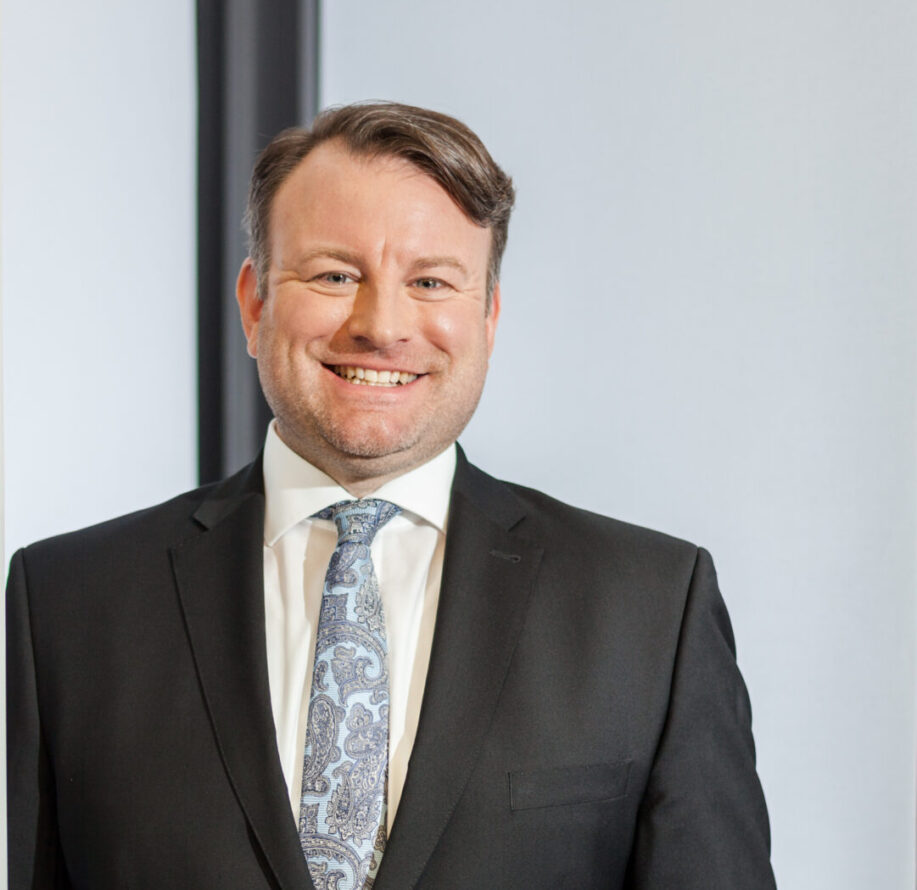
PROUT EMPLOYER ERGO
“I believe that in addition to the pure visibility that we achieve with pride networks, for example, other things are also important. We need to point out unconscious bias. We need gender inclusive language. ”
Markus Bader is 45 years old and lives with his partner in Hamburg. After studying business informatics, he joined Hamburg Mannheimer Versicherung, part of the ERGO Group, as IT coordinator in 2002. After 3 years he was able to take over a first management position as group leader in this area. In 2013 he had the opportunity to join a department manager position in ITERGO, the IT service provider of the ERGO Group. In 2018, he left IT with a step into business as division manager for Life Classic Operations.
As a leader at ERGO, what does it mean for you to advocate for more LGBT*IQ diversity and visibility?
Markus Bader: As a gay and outed executive, I think it’s important to advocate for more visibility and I’m glad that we’ve also had a pride network for a little over 2 years now and that I can get involved there. We know that there are still many LGBT*IQ people who decide against coming out in a professional context because they fear disadvantages. We need role models who make it clear that your choice of job and your career goals are not dependent on your sexual orientation.
What experiences in your career so far have shaped you in terms of LGBT*IQ?
Markus Bader: In fact, in the first (un-outed) years of my career, I had the experience that derogatory remarks were made about outed colleagues regarding their sexual orientation. Not always and often, but it happened. That definitely shaped me for the years to come. I didn’t feel ready to expose myself to that at the time. The confidence to come out to colleagues didn’t develop until a few years later. However, I never experienced rejection or disadvantages and to this day I am happy and grateful that I can be open with my sexuality with my employer. I was therefore all the more pleased that, in addition to the many other diversity issues, the topic of LGBT*IQ has also become an institution at ERGO with the Pride network.
You are committed to LGBT*IQ diversity at ERGO, to what extent do you receive support from your colleagues?
Markus Bader:
From my immediate colleagues, I feel the normality and matter-of-factness that my life model is met with is actually the strongest support. Today, I never have the feeling that someone avoids asking me how my summer vacation with my partner was, for example, just to avoid bringing up the subject. On the contrary – I experience just as much interest in my life and partnership as I do with others.
pride@ergo was founded by committed colleagues.
The Diversity Management Team has provided support from network building to the present day, and the godmother of our network is our Chief Human Resources Officer. This is an important contribution on the part of the employer and also shows me that the topic is important and is seen.
You were part of the PROUT Executives list in 2021 and 2022, congratulations again! What did that mean for you and how did you perceive the reactions?
Markus Bader: I was very happy about the positions on the Prout Executives list. For me personally, it was also an exciting process – I’m not very active on my social media channels, or rather a consumer than a creator. Sharing the list position on LinkedIn, among other places, was another new experience for me – and I received positive feedback without exception afterwards – from previously unknown people, from people I had lost sight of, but also from my immediate environment.
What specific actions for more LGBT*IQ diversity are you concerned about right now?
Markus Bader: I believe that in addition to the pure visibility that we achieve with pride networks, for example, other things are also important. We need to point out unconscious bias. We need gender-inclusive language. We have already revised the language and image of our brand presence at ERGO. This will certainly not happen overnight, but we have made a start, and ERGO must continue to develop.
Dear Markus Bader, thank you very much for the interview!
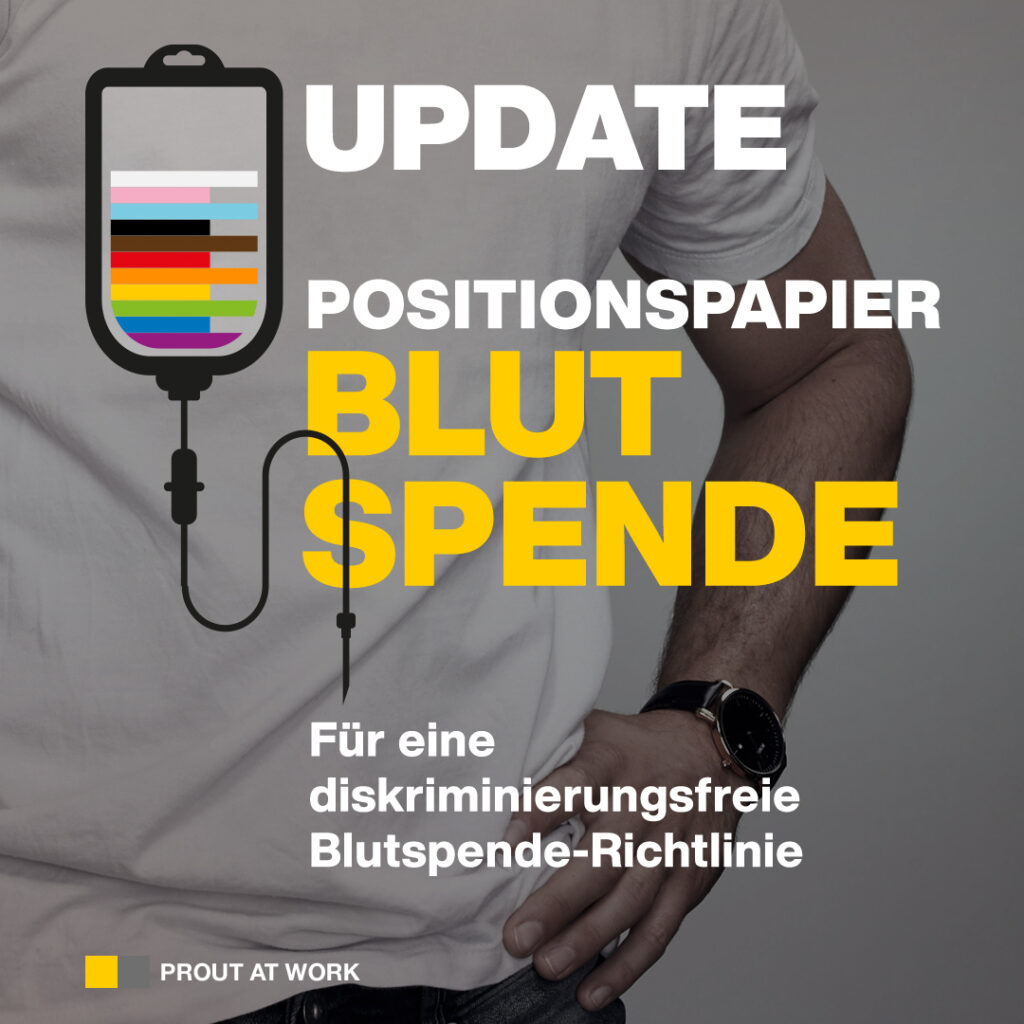
Update from the 16. of March 2023: On March 16, the Bundestag decided to end the existing discrimination in blood donation. As a result of the amendment to the Transfusion Act, the German Medical Association is now required to issue new guidelines for blood donation.
Specifically, the resolution states, “The assessment of a risk due to sexual behavior that leads to exclusion or deferral from donation must be based on the individual sexual behavior of the person willing to donate. The sexual orientation and gender identity of the person willing to donate or the sexual partners of the person willing to donate shall not be considered in the evaluation of the risk leading to exclusion or deferral from donation.”
Update on blood donation: According to current reports, a further step against discrimination against gay and bisexual men and trans* people will be taken from April 1, 2023 and a provision from the current coalition agreement will be fulfilled. Currently, there is a four-month provision period for “people with sexual risk behavior.”
The new regulation would require the Federal Medical Association by law to work with the Paul Ehrlich Institute within four months to adjust the guidelines to eliminate the four-month deferral period for gay and bisexual men and trans* people due to sexual contact with more than one person. Karl Lauterbach, the Federal Minister of Health, said: “Blood donation is a matter of risk behavior, not sexual orientation. There must be no hidden discrimination on this issue either.” With this, Lauterbach makes it clear that the deferral from blood donation is an outdated, discriminatory concept and that the risk behavior (in this case frequently changing sexual partners*) of all people should be valued equally.
But what is it actually about? Read more about the topic on our website.
Moving critical Masses
Let’s take action together to advance LGBT*IQ issues.
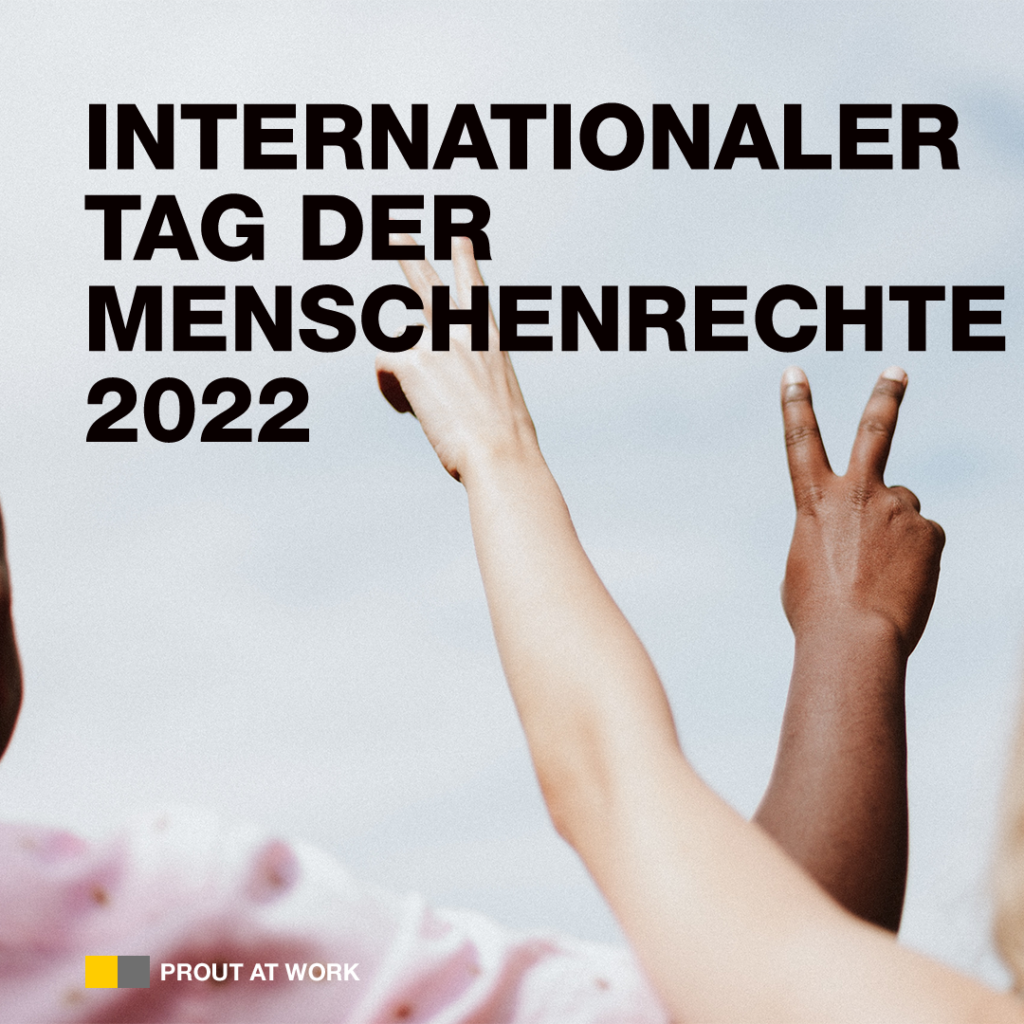
International Human Rights Day is a commemorative day that takes place annually on December 10 and will reach its 75th anniversary next year. In 1948, the United Nations General Assembly agreed on a Universal Declaration of Human Rights, which was signed by 48 countries.
After the end of the Nazi regime and the horrors of World War II, the aim was to create a comprehensive basis for a worldwide understanding in which all people are equal.
The International Declaration of Human Rights in one click (German):
At the heart of this declaration is the universal validity of fundamental rights that every human being has from birth and that are independent of origin, gender, religion, worldview, culture or other affiliations.
The principles laid down include, for example, the right to life, liberty and security, a ban on slavery and torture, freedom of thought, belief and expression, the right to education, work, health and many others, such as the right to citizenship and political participation.
For the first time in history, rights were formulated that should apply equally to every human being. Nevertheless, the Universal Declaration of Human Rights is not binding under international law. It is true that many states (such as the Federal Republic of Germany) have decided to base their constitutions on human rights and thus make them legally binding in part. However, there is no globally valid obligation, e.g. even beyond the United Nations, to observe human rights, nor are there any bodies that could guarantee enforcement.
Especially against this background, the International Human Rights Day is an important moment to remind that these universal rights are far from being universally enforced. Human rights are perhaps the most important yardstick and basis for creating a democratic world in which all people are equal before the state, the law and their fellow human beings. Therefore, we as a foundation also make it clear that our issue, equal opportunities for LGBT*IQ in the (working) world, must be understood as an issue of human rights and human dignity. We join this year’s slogan of the International Human Rights Day and stand up for
„Dignity, Freedom, and Justice for All“!
You can find information on this year’s slogan and International Human Rights Day at United Nations:
Moving critical masses
Let’s become active together and let us drive LGBT*IQ topics,
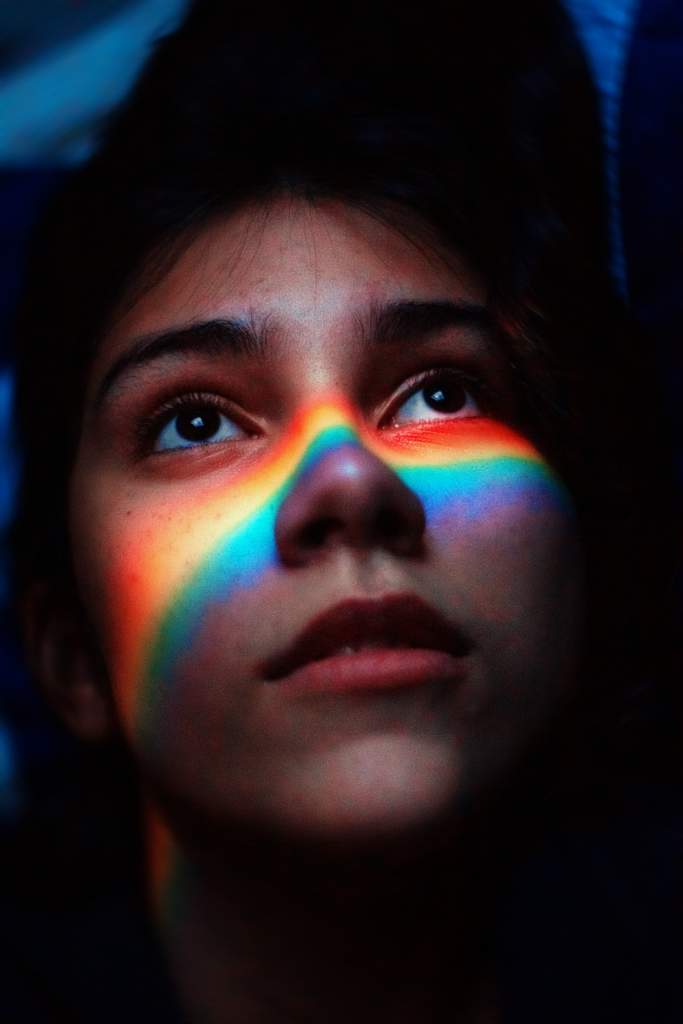
October 19 is International Pronouns Day!
Individual Pronouns are strongly interlaced with the identity and selfgovernment of LGBT*IQ-people. Especially people, who do not strictly experience their gender in a binary sense of male/female, but may identify as genderfluid or nonbinary, use pronouns to express their gender, as not to be judged by their looks, or be misgendered.
In some cases, neopronouns are preferred (for example dey/dem), in other cases no pronouns are used at all, instead their name is used.
Pronouns can help get rid of biases about a persons gender, and they create diversity in the community.
Many people in the LGBT*IQ-Community use them to take a stand against solely binary understanding of gender, and to feel safe and happy with their own identity.
